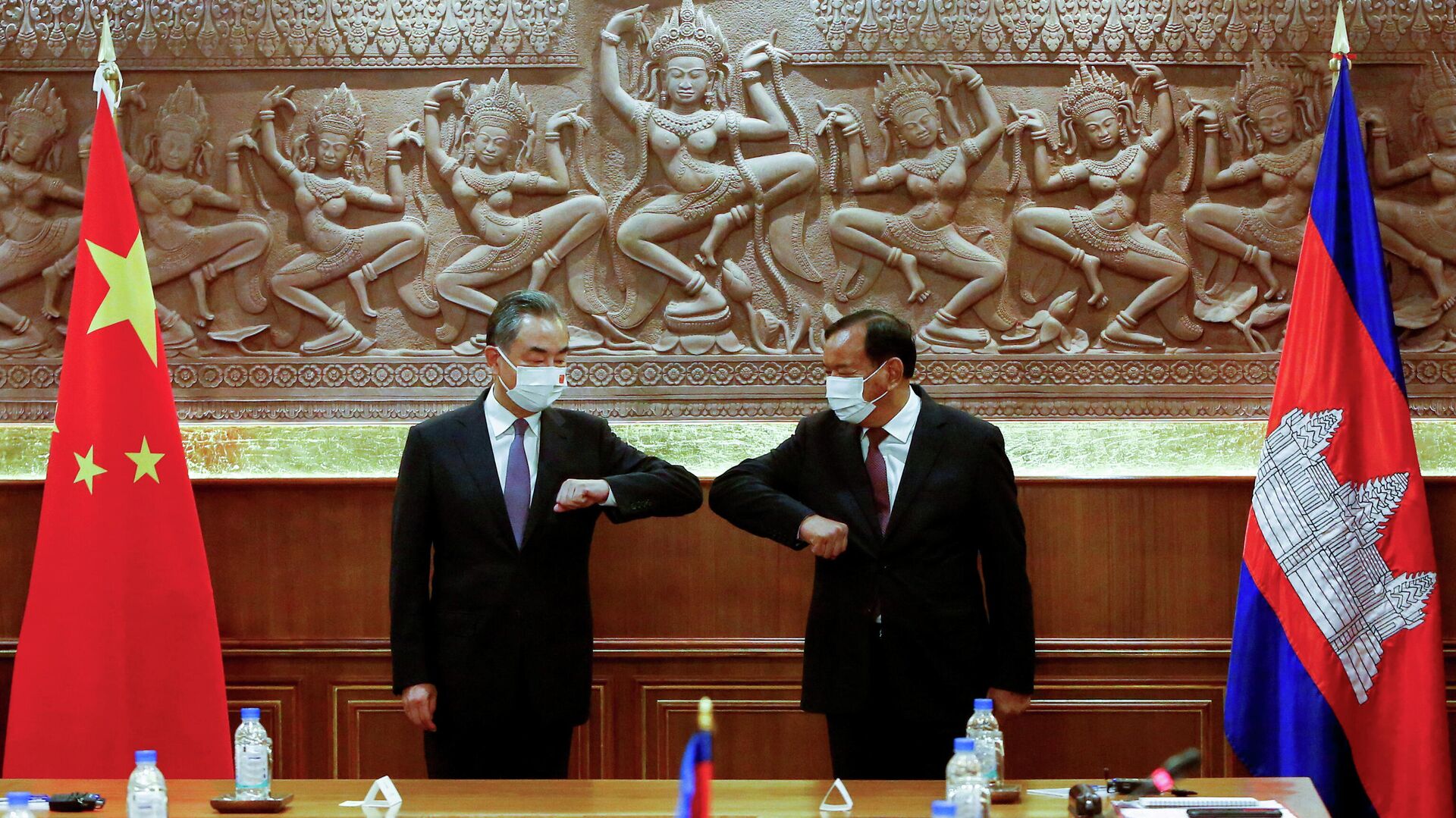Chinese FM Wang Pushes RCEP Ratification in Southeast Asia Tour After Cambodian Lawmakers Okay Pact

© REUTERS / Kith Serey
Subscribe
Chinese Foreign Minister Wang Yi is visiting several Southeast Asian nations in a bid to push ratification of the Regional Comprehensive Economic Partnership (RCEP) Agreement and shore up their relations with Beijing. His visit comes after trips by several senior US officials aimed at turning those nations into adversaries of China.
Wang’s weeklong tour began in Vietnam on Friday and will touch Cambodia, Singapore and South Korea, as well.
In Vietnam, Wang urged that disputes in the South China Sea should not be allowed to disrupt the hard-won peace and stability in the region. China and Vietnam have made competing claims over island chains and sea lanes in the waterway, and can often be seen harassing the fishing fleets and oceanography vessels of the other nation in disputed waters. However, both nations’ claims are also contested in part by several other countries, including Malaysia, Brunei, the Philippines, and Taiwan.
Wang also announced that China would donate 3 million more COVID-19 vaccines to Vietnam, bringing the total supplied to 5.7 million, and urged Hanoi to ratify the RCEP agreement.
On Sunday, Wang went to Phnom Penh, where last week, Cambodia became the fourth nation to ratify the agreement. A massive Asian trade pact signed by 15 nations in November 2020, it will include 30% of the world’s population and 30% of its gross domestic product in a single common market. However, it cannot enter force without being ratified by six of the 10 members of the Association of Southeast Asian Nations (ASEAN) and three of the five non-ASEAN nations.
So far, Cambodia and Singapore are the only ASEAN members to ratify RCEP, while non-members China and Japan have also ratified it.
Dato Lim Jock Hoi, secretary-general of ASEAN, hailed RCEP last week at the 18th China-ASEAN Expo in Nanning, saying it had the potential to play a significant part on the region’s economic recovery from the COVID-19 pandemic - if it enters force in time.
"To reap the rewards of the RCEP, we need to ensure the timely entry into force of the RCEP agreement," Dato Lim stated, as quoted by Xinhua News Agency.
Tan Sri Dato' Azman Hashim, Chairman of Malaysia-based AmBank Group, said at the expo that RCEP member nations’ combined GDP could grow to a majority of world production under the pact, collectively gaining at least $174 billion in real income by 2030.
Cambodian Commerce Minister Pan Sorasak told lawmakers government forecasts suggest entering RCEP would boost GDP by 2%, the country’s exports by 7.3% and investment by 23.4%.
“The RCEP agreement will become the core foundation for trade and investment in the region, further expand regional value chains and create more employment and market opportunities for peoples and businesses in the region,” he said, according to the Khmer Times.
Wang also promised $270 million in aid to Phnom Penh and 3 million more COVID-19 vaccines on Sunday, having already received more than 26 million vaccines from China.
His visit comes just two weeks after US Vice President Kamala Harris traveled to Singapore and Vietnam to pressure them to join the US drive to block Chinese interests in the region.
“We need to find ways to pressure and raise the pressure, frankly, on Beijing to abide by the United Nations Convention on the Law of the Sea, and to challenge its bullying and excessive maritime claims,” she said at a meeting with Vietnamese President Nguyen Xuan Phuc.
Harris also came to promise 1 million vaccines to Vietnam as part of the US goodwill push. However, after her transit was delayed by several hours, a Chinese diplomat quickly moved to promise Hanoi 3 million vaccines.
In response, Prime Minister Phạm Minh Chính thanked the envoy, but said Vietnam “does not ally with one country to fight against another.” Hanoi fought defensive wars against both states in the 20th century but, like China, maintains a policy of nonalignment.
Earlier in the summer, US Secretary of Defense Lloyd Austin visited Singapore and Vietnam, as well as the Philippines. Deputy Secretary of State Wendy Sherman went to Cambodia, South Korea, Mongolia and China, both on visits of much the same goal: aligning regional nations against China as part of the US’ new strategy of “Great Power competition” intended to forestall China’s rise to superpower status.
In contrast to Washington’s military-centered focus to resolving regional disputes with China, Beijing has promoted dialogue and worked to further economic integration across Asia using projects like the Belt and Road Initiative and smaller projects like Two Corridors One Belt in conjunction with Vietnam. Hanoi and Beijing agreed to set up a naval hotline for resolving issues earlier this year, and nations with competing South China Sea claims have pledged to work toward finishing a code of conduct based on the UNCLOS.
